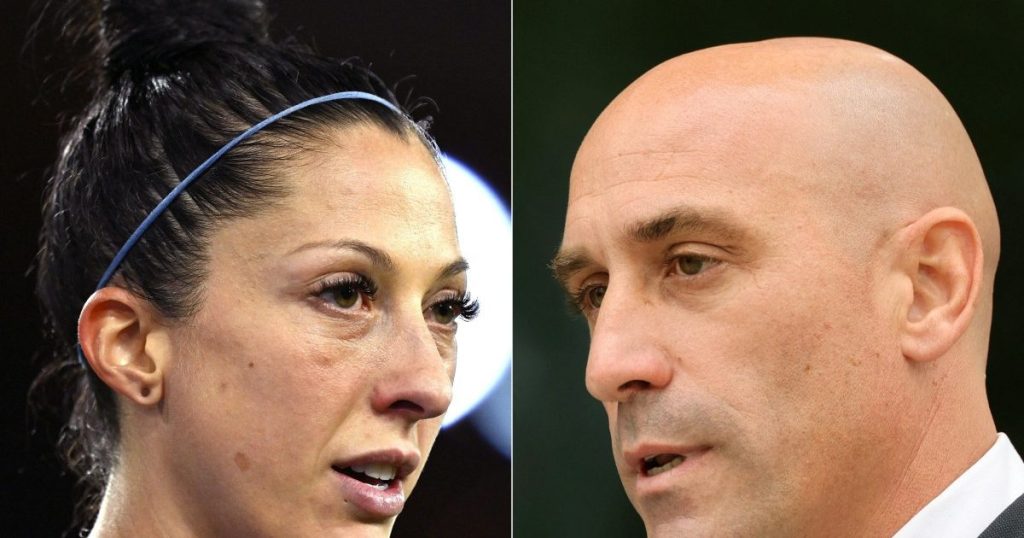The landmark case of Luis Rubiales, the former president of the Royal Spanish Football Federation (RFEF), and Jenni Hermoso, a star player of the Spanish women’s national football team, has taken a new turn. The initial verdict, which found Rubiales guilty of sexual assault but imposed only a fine, has been met with dissatisfaction from both parties, with both Rubiales and Hermoso indicating their intention to appeal. This case, which stemmed from a non-consensual kiss Rubiales planted on Hermoso during the Women’s World Cup victory celebrations, has sparked international outrage and ignited a broader conversation about consent, power dynamics, and sexism in sports.
The incident itself, captured on live television, showed Rubiales grabbing Hermoso’s head and kissing her on the lips after Spain’s historic victory. Hermoso later stated that the kiss was unwanted and that she felt vulnerable and pressured in the aftermath. Rubiales initially dismissed the criticism, claiming the kiss was consensual and downplaying the incident. However, mounting pressure from players, politicians, and the public forced him to step down from his position as president of the RFEF. The Spanish prosecutor’s office subsequently filed charges against him, seeking a two-and-a-half-year prison sentence for sexual assault and coercion.
The judge’s decision to impose a fine instead of a prison sentence has drawn mixed reactions. While some argue that the fine, amounting to 10,800 euros (approximately $11,300 USD), sends a message that such behavior is unacceptable, others believe it is a lenient punishment that fails to adequately address the gravity of the offense. The prosecution had argued that Rubiales abused his position of power and authority over Hermoso, creating a coercive environment that made it difficult for her to express her lack of consent. This aspect of the case has resonated with many who see it as emblematic of wider issues of sexism and power imbalances in sport.
Hermoso’s decision to appeal the verdict, as announced by her lawyer, signals her determination to pursue a stronger legal response. The initial verdict, while acknowledging the non-consensual nature of the kiss, did not fully satisfy Hermoso’s pursuit of justice. Her appeal suggests a desire for a more substantial penalty for Rubiales and potentially a stronger recognition of the coercive context surrounding the incident. This appeal further highlights the importance of respecting individual autonomy and consent, especially in situations involving power imbalances. It also emphasizes the need for legal systems to adequately address cases of sexual assault and coercion, sending a clear message that such behavior will not be tolerated.
Rubiales’ decision to appeal also adds another layer of complexity to the case. He maintains his innocence, claiming the kiss was mutually desired and that he is a victim of a “political and media lynching.” His appeal contests the court’s finding of sexual assault and seeks to overturn the imposed fine. This conflicting stance further polarizes the debate and underscores the challenges of navigating legal processes related to sexual assault, particularly when involving high-profile individuals and complex power dynamics. The diverging appeals from both parties set the stage for a protracted legal battle, with each side seeking a different outcome and interpretation of the events.
The Rubiales-Hermoso case has transcended the realm of sports, becoming a symbol of the ongoing fight against sexual harassment and abuse. It has sparked crucial conversations about consent, power dynamics, and the importance of believing survivors. The case has also highlighted the need for stronger mechanisms within sporting organizations to address and prevent such incidents. The appeals from both parties ensure that this case will continue to be a focal point in discussions about sexual assault and its repercussions, potentially influencing future legal precedents and societal attitudes towards issues of consent and accountability. The final outcome of this legal process will undoubtedly have significant implications not only for the individuals involved but also for the broader movement towards creating safer and more equitable environments in sports and beyond.


